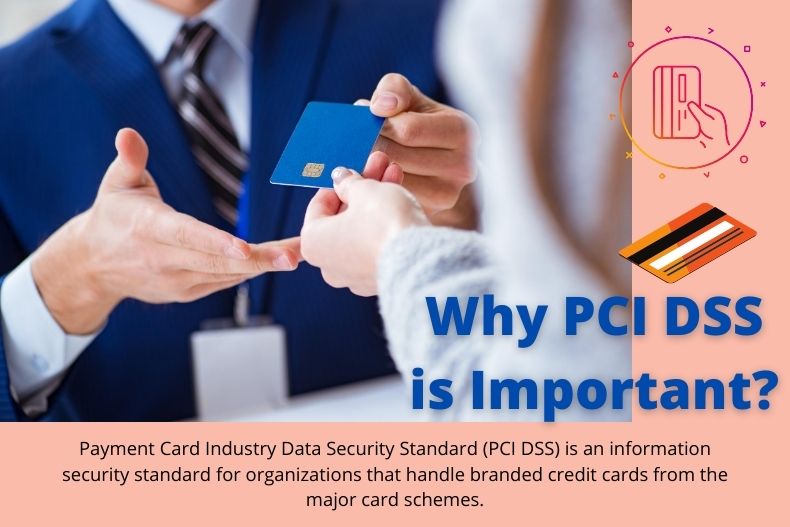Every business that accepts credit or debit card payments online must meet PCI DSS standards. Security breaches are ever-increasing threats to websites that may hinder the consumers’ trust in a business. The losses stemming from a data breach would be dramatic to a business’ finances and its image. You must ensure your business meets PCI DSS standards for its success.
The reasons why you must employ a PCI DSS plan involve the financial and security aspects of the work. Your business’ integrity and functionality will also play roles in how well PCI compliance can serve your company.

Understanding PCI DSS
The Payment Card Industry Data Security Standard is a rule utilized by organizations that read and process branded credit cards. PCI DSS rules involve the technical demands necessary for protecting cards during the processing, storage, and data transmission efforts.
PCI DSS standards entail twelve standards for success. Most of these involve the protection of the customer’s data, but workplace behaviors and rules may also play a role in how the security plan works:
- Firewall protection on a network
- The security of cardholder data
- Configured passwords and settings
- The encryption of cardholder data within a public network
- Anti-virus software use, including frequent checks and updates
- Restricting access to cardholder data on a need-to-know basis
- Applying a unique ID to each worker who has computer access
- Restrictions on physical access to cardholder and workplace data
- Consistent updates and fixes on processing systems
- Log management setups
- Vulnerability scans, including tests to find potential penetration sites
- Documentation of all security plans
PCI DSS rules cover how your business handles data and how it prevents theft. Such terms include securing content and data based on the employee or other person who has access to the content.
You may meet a specific compliance level for work, although the level you need to meet will vary by the number of transactions you complete each year. These levels are as follows:
- Level 1 (more than six million transactions) – Onsite PCI reviews and quarterly network scans
- Level 2 (1-6 million) – Annual self-assessment and quarterly scans
- Level 3 (20,000-1 million) – Quarterly reviews
- Level 4 (less than 20,000) – Annual network scans
A business that takes in more transactions will require additional PCI DSS support. Your business must utilize multiple functions for its success in protecting data. A self-assessment questionnaire or SAQ is necessary, but a qualified security assessor or QSA may conduct more in-depth reviews.
Protect Your Customers
The first reason why PCI DSS is critical to your business is that you can use PCI DSS standards to protect your customers. Hackers can collect many bits of data from a credit or debit card. A hacker can try to steal the primary account number on the card, a card security code, and any data on some tracks on a magnetic strip. A criminal could gather this data from a payment system database or a secret tap on a card processing network. Skimming devices may also attempt to gather data through devices utilized to physically read card data. Secret cameras may also be a threat.
PCI DSS solutions entail physical and software-based solutions for protecting cardholder information. A card reader and a point of sale system must use suitable encryption to prevent data from being exposed while in transit. Any storage systems a business hires for storing card data must also be secure.
Secures Business Data
The second point about PCI DSS is that the standard establishes rules for how you will protect your business’ data. Your company’s infrastructure is vulnerable to many outside concerns, including:
- Remote-access attacks
- Phishing attacks that come from accounts that appear trustworthy
- Ransomware; an average ransom demand may be worth hundreds of thousands of dollars
- Malware attacks, including ones that come from spam emails
- Social engineering, a practice where people are misled to provide data to others
- Improper use of customer and business data by employees
PCI DSS rules focus on ensuring a business is protected against such threats. PCI DSS plans involve using software and hardware solutions to prevent these concerns. General business practices may also provide guidelines for employees to handle work.
You would have to educate your employees on how your PCI DSS routines work and what people can get out of these efforts. Your workers must understand how your PCI DSS projects run and what they can do to facilitate the information you secure and handle.
Prevent Extensive Financial Losses
PCI DSS support ensures you will not experience substantial financial losses. Your business could lose thousands of dollars in fees and expenses stemming from a data breach. Some of these expenses come from:
- Fines from the government
- Lawsuits, including ones from people who lose their data
- Fines for compromising a card brand or merchant processor system
- Investigation costs for monitoring the issue
- Security updates to fix the concern
- Repairs, including fixes for security systems and computers
- Expenses for managing customer accounts, including reissuing new cards and providing free credit monitoring to all impacted customers
- Lawyer fees
You could spend at least $100,000 in fees due to a data breach. Such expenses may place a business in jeopardy, depending on the charges. PCI DSS plans will keep these expenses from being a threat to your bottom line, as you will prevent issues that may produce such costs.
PCI DSS solutions will also protect your company’s image and brand. By keeping the customers’ data protected, people will trust your business and be more interested in what you provide.
Use PCI DSS Protection Today
You have to ensure your PCI DSS plans are in place and that you have a solution for managing payment card transactions. Every business that wishes to support credit card transactions should follow PCI DSS rules. All data your business handles will be safe, plus you will avoid the financial threats that come with losing data.
About the Contributor:
Lou Honick is the CEO of Host Merchant Services. Prior to founding Host Merchant Services in 2010, Lou was the founder of HostMySite.com and received numerous awards including SBA Young Entrepreneur of the Year, Inc Magazine 30 under 30, and multiple listings on the Inc 500. As a serial entrepreneur, all of his companies have operated on a singular devotion to outstanding customer service and support. Lou is a respected expert on the topics of customer service, payments and fintech, Internet technology, and entrepreneurship.







